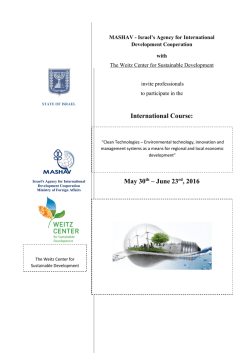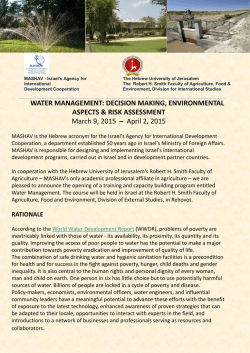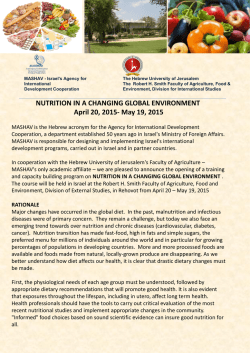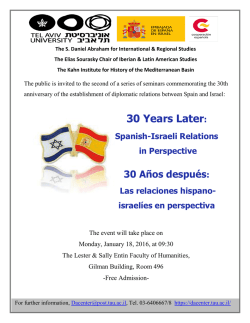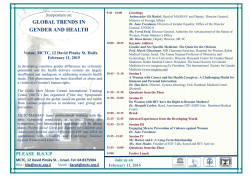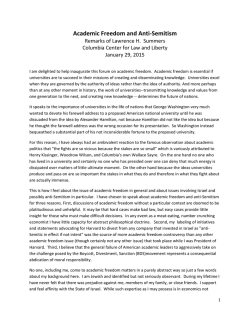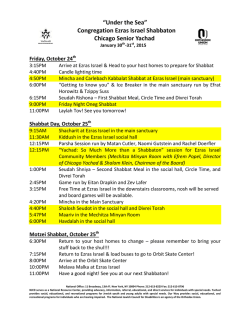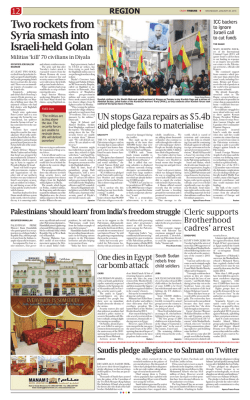
A Comprehensive Drug Control Strategy – Israel`s Model
MASHAV - Israel’s Agency for International Development Cooperation with STATE OF ISRAEL The Aharon Ofri MASHAV Educational International Training Center (METC) & The Israel Anti-Drug Authority & The United Nations Office on Drugs and Crime Israel's Agency for International Development Cooperation Ministry of Foreign Affairs invite professionals The Aharon Ofri to participate in the MASHAV International Educational Training Center (METC) International Course: A Comprehensive Drug Control Strategy – Israel’s Model June 26th – July 15th, 2016 מיקום תמונה Background Drug abuse is a global problem. It destroys lives and communities and affects people worldwide, in all countries. Drug abuse has devastating social and economic consequences for all members of the community and society. Over the years, it has become clear that the drug problem needs to be addressed both in terms of demand and supply reduction, interconnected issues which must be incorporated as part of an integral drug control strategy. Governments are increasingly establishing integrated demand and supply reduction approaches and strategies, however, in many cases there is still a lack of coordination between relevant agencies. Israel would like to share some of its experience in assisting other countries to incorporate demand reduction approaches into their national drug control strategies, while emphasizing the essential need for effective cooperation and coordination between the relevant government ministries and non-governmental entities involved in the battle against drugs. Since 1988, Israel's drug control efforts have been coordinated by the Israel Anti- Drug Authority (IADA). IADA is a statutory corporation, established by virtue of the "Drug Control Authority Law, 5748-1988". Under IADA's umbrella, professionals in government and non-governmental agencies work together to rid Israel of the plague of drugs. This cooperation and coordination stretches across all areas of drug control, from prevention and treatment, to law enforcement. Key to Israel's drug control strategy is the issue of demand reduction, which is an integral aspect of the national strategy. Demand reduction is addressed at all levels, with programs ranging from primary prevention programs at schools and in the communities and prevention programs for soldiers in the IDF to harm reduction programs aimed at drug abusers. Programs are based on the belief that different communities and subpopulations have different needs, and all programs are culture and gender sensitive. Israel's diverse population is composed in large by immigrants from all over the world. The various predominant religious and ethnic groups, as well as large immigrant populations from the former Soviet Union and Ethiopia in particular form a very heterogeneous population with very different backgrounds, cultures and customs. Over the years, Israel has learned to appreciate this diversity and recognizes the populations’ individual needs. With this in mind, it has created culture-sensitive programs, addressing the needs and characteristics of each group. Treatment and rehabilitation programs are offered to all those harmed by drugs, with the belief that each individual needs a different kind of treatment. Programs include drug substitution methods, detox centers and residential treatment facilities, and are tailored specifically for all types of subpopulations, ranging from youth to drug abusers in the prison system. Aims To address the specific needs of the participating countries. To generate personal commitment among course participants to promote drug control efforts in their countries and communities based on the models developed in Israel. To encourage continuing and meaningful partnerships between Israel and the participating delegations, including assistance in the implementation of programs and strategies in their countries. To provide an exceptional platform for exchange of knowledge between participants based on their national experiences. To offer participants an in depth overview of Israel's drug control strategy, based on the work done by the Israel Anti-Drug Authority as the principal coordinating body in the field. To enable participants to learn more in depth about Israel's demand reduction strategy, an integral component of the national drug control strategy, by emphasizing all related issues: prevention, treatment and rehabilitation, community action and more. To stress the importance of coordination between all agencies involved in the country's drug control strategy. 2 Main Subjects The course will be conducted in the form of lectures and workshops, including group work, interactive teaching, role playing, and other participatory techniques. Following are some of the topics that will be dealt with during the course: Treatment and Rehabilitation Educational Drug Prevention Programs The Problem of Drug and Alcohol among Addicted Immigrants Crime among Youth in Israel “Where Different Cultures Meet” – Dilemmas and Working Tools The Ministry of Health – Policy and services Police Enforcement of the Law against Drug Abuse General Law Enforcement Tax Enforcement within National Anti-Drug Activities Pharmaceutical Crime Unit’s Projects Community Development at the National and Local Levels Dealing with Parents’ Alcoholism The Importance of Research Findings for Drug Policy Resource Training About the Course Application Application Requirements The course will be aimed at professional staff working in the field of drugs from UNODC as well as professionals representatives from developing countries around the world, in the following areas: prevention, treatment, law enforcement. Application forms should be sent to the relevant Israeli Mission and to the Ofri Center Application forms Application forms and other information may be obtained at the nearest Israeli mission or at MASHAV’s website: http://mashav.mfa.gov.il/MFA/mashav/Courses/Pages/default.aspx. Completed application forms, including the medical form, should be sent to the relevant Israeli mission in the respective country. General Information Arrival and Departure Arrival date: 26.6.2016 Opening date: 27.6.2016 Closing date: 14.7.2016 Departure date: 15.7.2016 Participants must arrive at the training center on the arrival date, and leave on the departure date. Early arrivals/late departures if required, must be arranged by the participants themselves, directly with the hotel/center, and must be paid for by the participant him/herself. 3 Location and Accommodation MASHAV awards a limited number of scholarships. The scholarship covers the cost of the training program including lectures and field visits, full board accommodation in double rooms (two participants per room), health insurance (see below) and transfers to and from the airport. Airfares and daily allowance are not included in the scholarship. Health Services Medical insurance covers medical services and hospitalization in case of emergency. It does not cover the treatment of chronic or serious diseases, specific medications taken by the participant on a regular basis, dental care and eyeglasses. Health authorities recommend that visitors to Israel make sure they have been inoculated against tetanus in the last ten years. Subject to the full binding policy conditions. Participants are responsible for all other expenses. The course will be held at The Aharon Ofri MASHAV Educational International Training Center (METC), situated in the Ramat Rachel Hotel on the outskirts of Jerusalem. Participants will be accommodated in double rooms (two participants per room). About MASHAV MASHAV – Israel’s Agency for International Development Cooperation is dedicated to providing developing countries with the best of Israel’s experience in development and planning. As a member of the family of nations, The State of Israel is committed to fulfilling its responsibility to contribute to the fight against poverty and to the global efforts to achieve sustainable development. MASHAV, representing Israel and its people, focuses its efforts on capacity building, sharing relevant expertise accumulated during Israel's own development experience to empower governments, communities and individuals to improve their own lives. MASHAV’s approach is to ensure social, economic and environmental sustainable development, and is taking active part in the international community’s process of shaping the Post-2015 Agenda, to define the new set of the global Sustainable Development Goals (SDGs). MASHAV’s activities focus primarily on areas in which Israel has a competitive advantage, including agriculture and rural development; water resources management; entrepreneurship and innovation; community development; medicine and public health, empowerment of women and education. Professional programs are based on a “train the trainers” approach to institutional and human capacity building, and are conducted both in Israel and abroad. Project development is supported by the seconding of short and long-term experts, as well as on-site interventions. Since its establishment, MASHAV has promoted the centrality of human resource enrichment and institutional capacity building in the development process – an approach which has attained global consensus. http://mashav.mfa.gov.il https://www.facebook.com/MASHAVisrael 4 About The Aharon Ofri MASHAV Educational International Training Center The Aharon Ofri MASHAV Educational International Training Center (METC) was established in 1989 as a professional extension of MASHAV - Israel’s Agency for International Development Cooperation. The activities are targeted to meet the Millennium Development Goals (MDGs) set by the United Nations to be fulfilled by the year 2015. The Center's vision is that education is the starting point for a person to build himself/herself a gate to new possibilities. Education is the key to a better future and shields against physical harm and confronts moral dilemmas. Education enables us to ask for proper healthcare when needed, and the way to stay healthy and adopt responsible behavior with our bodies. Education is sharing, learning and growing up together with others. Through education we can learn to take better care of our world, treat it respectfully and use wisely the resources it offers us. Education concerns itself with learning at all levels, from elementary and secondary school through adult education, and provides knowledge and training for basic skills development, civic awareness, community education, education for special populations, treatment for youth (Including those at risk), youth integration, youth leadership, education for health and the prevention of drugs abuse. Since its inception, the A. Ofri Center has trained thousands of professionals from countries throughout the world. The Center cooperates with senior staff in the Israeli Ministry of Education, academic experts, governmental organizations and non-governmental organizations. In addition, it communicates and cooperates with key international organizations such as UNESCO, OECD, USAID, UNODC, OAS, IOM and the World Bank. In adopting the UN’s Millennium Development Goals, the A. Ofri Center contributes to the sustainable development of human resources internationally, based on knowledge and experience accumulated in Israel. For further information, please contact: About The Aharon Ofri MASHAV Educational International Training Center Address: Tel: Fax: Email: Ramat Rachel, D.N. Tzfon Yehuda, 909000 972-2-6702508 972-2-6702538 [email protected] Website: www.ofri.org.il 5
© Copyright 2026

